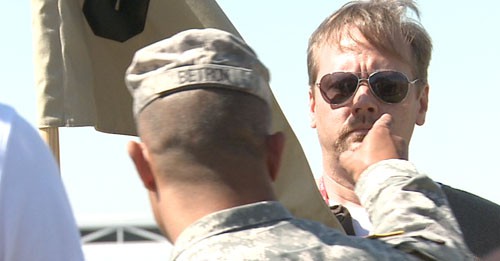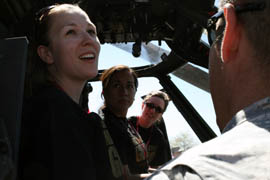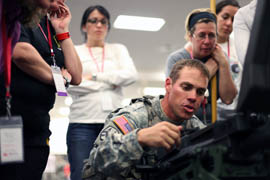Cronkite News has moved to a new home at cronkitenews.azpbs.org. Use this site to search archives from 2011 to May 2015. You can search the new site for current stories.
You’re in the Army now: Guard gives civilians two-day taste of military life
PHOENIX – Wearing a camouflage helmet and a metal-plated vest, Sarah Meske certainly looked like a soldier as she and others in her platoon marched to an Arizona National Guard instructor’s orders.
That is, until she shuffled her feet trying to keep in step. And struggled with her heavy gear.
Meske, a marketing manager, came to the Papago Park Military Reservation along with about 100 other civilians to see what it’s like to serve in the armed forces. This morning’s lesson: Marching in formation is a lot of work.
“I was surprised by the weight and also the focus you have to have in order to complete the orders,” Meske said.
It was the second year that the Arizona National Guard and the Arizona Coalition for Military Families have offered the two-day immersion experience.
Capt. Holly Brauer with the Arizona National Guard said the goal is helping participants better understand the physical and mental stresses of military life so they can relate to service members in need of care and support.
“We’re really hoping that they got a taste of the military culture that if service members and their families come to them that they’re able to assist them, better understand what they’re going through, and really just take that experience and pass it along to others,” she said.
The cohort was out at 5 a.m. for exercise, attended weapons and tactics demonstrations and dined on Meals Ready to Eat, among other experiences.
In one demonstration, participants learned how handling weapons contributes to the stress on service members. Arizona National Guard combat training officer Sgt. Barry Kiel noted that most .50-caliber machine guns don’t have safety switches.
“This is their safety,” he said, holding up his thumbs to show how soldiers fire the weapon. “You can imagine how easy it is to have a negligent discharge.”
Nicola Winkel, community liaison for the Arizona Coalition for Military Families, said understanding the sources of stress is important because community members often are the first to notice that a service member is facing problems.
“Maybe that person can be a link to a counseling resource or a support resource that can help intervene at a critical time and prevent the individuals and families from kind of going down that road of stress and crisis that can end in things like suicide or more serious issues,” she said.
Participants also attended seminars on programs that help service members cope with stress and talked with those who have seen combat.
For Jacqueline Gordon, who has a daughter stationed at Fort Drum, N.Y., those discussions were the most difficult part of the experience. The speakers said that relatives can put stress on service members during visits home by building in too many social obligations.
Gordon said she realized the the way she welcomed her daughter home did more harm than good.
“We’re all excited when she comes home, so everybody wants a piece of her, and we just pull her in every different direction,” Gordon said.
Rachelle Hornby, president of the Tucson chapter of Blue Star Mothers, a support group for relatives of service members, said she was happy to learn about the military’s efforts to identify and treat post-traumatic stress disorder.
“From our perspective up until now, it seemed like a lot of soldiers were slipping through the cracks,” said Hornby, who has two sons in the Army.
Meske said she gained a greater appreciation of those she serves as an employee of TriWest Healthcare Alliance, a health care provider for service members and veterans.
“These men and women do not have it easy,” she said. “It’s a hard line to toe, and I’m just so impressed what they do each and every day for me and for our country.”











